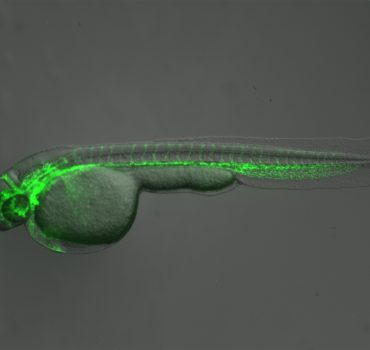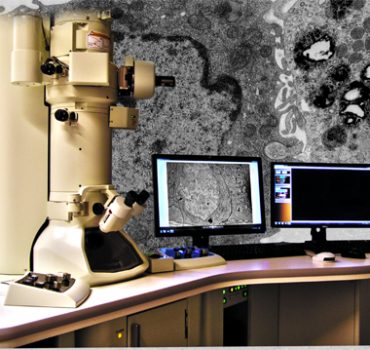Research Groups and R&D Platforms: Basic research

R&D Platform:
Zebrafish Core Facility
Zebrafish (Danio Rerio) is a small freshwater fish that has gained increasing use as a scientific model organism during recent years. As a model organism, the genome of zebrafish can be easily modified using transgenesis and targeted mutagenesis. The externally developing eggs provide a convenient, economic and ethical model for various in vivo studies. As a vertebrate, zebrafish is often used to study development, angiogenesis, cancer biology and regeneration to name few research areas. Zebrafish embryos are also emerging in vivo model for screening toxicity and effectiveness of chemical compounds. Increasing number of mutants, transgenic lines and disease models have been generated recently and are available from international stock centres.
Zebrafish Core Facility provides assistance, expert consulting, training and necessary equipment to perform experiments utilizing zebrafish models. Basic maintenance and housing of zebrafish is organized by the Zebrafish Core Facility. Consulting covers eg. finding and acquiring appropriate fish lines, help in licence applications and experimental design. Established protocols for various zebrafish methods, such as embryo culture, transgenesis, targeted mutagenesis and sample preparation, are available through the Core Facility. Core facility arranges training in the scientific use of zebrafish models.
Contact: zebrafish[at]bioscience.fi
Basic research, Disease models, Target discovery

R&D Platform:
Genome Editing Core
Genome Editing Core produces lenti, adeno and retroviral vectors as a service to research labs. We deliver high titer, concentrated viruses ready to use in your experiments. Custom designed stably transduced cell lines with gene knockdown or overexpression are also be produced. We also produce Lenti-CRISPR-Cas9 gene modification tools. Our speciality areas are transduction of stem cells and primary cultures and we are happy to guide you to optimize transductions in your system of interest. For users wishing to work with viruses, we will train you in safe handling of viruses and provide a fully equipped and maintained Biosafety level 2 lab. The Genome Editing Core is part of the Biocenter Finland Viral Gene Transfer network.
Contact
Email viral_vectors[at]btk.fi
Phone +358-2-3338021
Basic research, Drug target, Screening, Signaling, Target discovery

R&D Platform:
Laboratory of Electron Microscopy
Laboratory of Electron Microscopy is a core facility open for everyone who needs electron microscopy in their work. The EM core offers all the services needed for electron microscopic studies including specimen preparation, imaging with electron microscopes and help in questions related to EM.
Laboratory of Electron Microscopy
Basic research, Electron microscopy, Imaging, Target discovery

Research Group:
Molecular epidemiology, carriage and antimicrobial susceptibility of bacterial pathogens
Jaana Vuopio
jaana.vuopio[at]utu.fi
Institute of Biomedicine,
University of Turku
Antibacterial, Antibodies, Bacteriology, Basic research, Bioinformatics, Biomarker, Biomedicine, Clinical Medicine, Data mining, Diagnostics, Epidemiology, Genetics, Genomics, Immunology, In Vitro Diagnostics, In Vivo Diagnostics, Infection, Inflammation, Molecular diagnostics, Next-generation sequencing, Nucleic acids, Personalized medicine, Point of care, Receptor

Research Group:
Osmotic stress signaling in Arabidopsis
Hiroaki Fujii
hiroaki.fujii[at]utu.fi
Molecular Plant Biology,
Department of Life Technologies,
University of Turku
Basic research, Biochemistry, Molecular Biology

Research Group:
PET imaging of neuropathological changes in animal models of Alzheimer’s disease
Merja Haaparanta-Solin
mehaaso[at]utu.fi
Turku PET Centre, Preclinical Imaging,
University of Turku
Ageing-related diseases, Antibodies, Autoimmune diseases, Basic research, Biochemistry, Biomarker, Biomedicine, Cardiovascular diseases, Diabetes, Disease models, Drug target, Imaging, In Vitro Diagnostics, In Vivo Diagnostics, Inflammation, Metabolic diseases, Nanoparticles, Neurological disorders, Organic compounds, PET, Pharmacology, Preclinical development, Receptor, Target discovery



